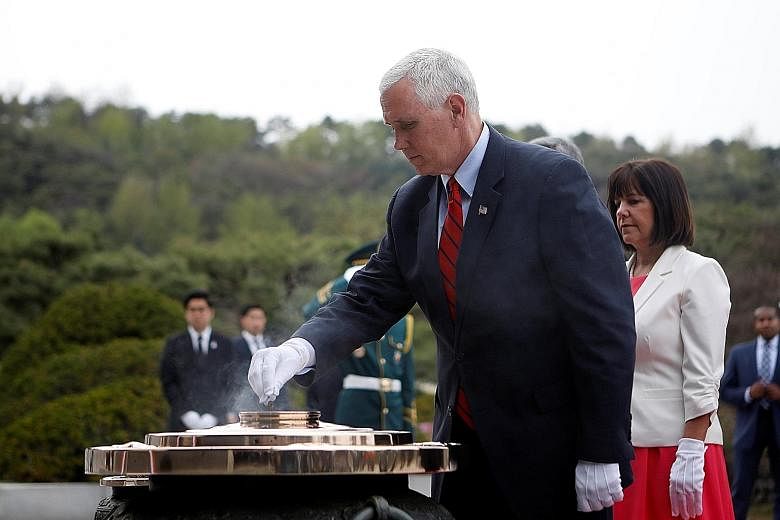SEOUL • United States Vice-President Mike Pence said yesterday that his country's resolve and commitment to its alliance with South Korea has never been stronger.
"Let me assure you under President (Donald) Trump's leadership, our resolve has never been stronger. Our commitment to this historic alliance with the courageous people of South Korea has never been stronger," he said, addressing an Easter service with American troops in South Korea.
His remarks at the service came after North Korea launched a missile off its east coast. The missile blew up almost immediately after it was launched at around dawn yesterday.
Mr Pence described the missile test as a "provocation".
"This morning's provocation from the North is just the latest reminder of the risks each one of you face every day in the defence of the freedom of the people of South Korea and the defence of America in this part of the world," he told American troops.
"Your willingness to step forward, to serve, to stand firm without fear inspires our nation and inspires the world, and it is an honour for us to share this meal with you today," he was quoted as saying by military newspaper Stars and Stripes.
There are 28,500 American troops in South Korea.
Mr Pence was starting a 10-day, four-nation trip to Asia in what his aides said was a sign of US commitment to its ally in the face of rising tensions in the region. The visit is his first to Asia since taking office in January.
Right after touching down at Osan Air Base in Pyeongtaek, 70km south of Seoul, he visited South Korea's national cemetery in a symbolic gesture to highlight the alliance forged during the 1950-1953 Korean War.
"Pence laid a wreath for veterans at Seoul National Cemetery and honoured those who sacrificed their lives for our two countries," the US Embassy in Seoul said in a tweet.
Mr Pence will be meeting South Korea's Acting President and Prime Minister Hwang Kyo Ahn and National Assembly Speaker Chung Sye Kyun today. During the meeting with Mr Hwang, they are expected to discuss bilateral cooperation to denuclearise North Korea.
Mr Pence is also likely to explain to Mr Hwang the Trump administration's North Korea policy, according to Yonhap news agency.
During their talks, they are expected to discuss the ongoing installation of a US anti-missile defence system on the Korean peninsula. Observers say the two sides might reaffirm the deployment of the Terminal High Altitude Area Defence (Thaad) system, and call on Beijing to stop its economic retaliation against South Korea.
Beijing opposes the deployment of Thaad, whose powerful radar system could penetrate into Chinese territory.
Mr Pence is expected to visit the Demilitarized Zone as well and give a speech at the American Chamber of Commerce.
The US has indicated that it could take a more aggressive approach against Pyongyang.
The US nuclear-powered Carl Vinson aircraft carrier strike group is heading to the region.
On April 7, America launched missile strikes on a Syrian airfield to punish the Bashar al-Assad regime for a suspected chemical attack on its own people. Less than a week later, the US dropped its largest non-nuclear bomb on an Islamic State in Iraq and Syria complex in Afghanistan.
These developments have raised fears of a pre-emptive American military strike on the North, which has conducted several missile and nuclear tests in defiance of United Nations sanctions.
South Korea has said that there would be no such attack without its consent.
The Korean peninsula remains technically at war because the 1950-1953 Korean War was halted by an armistice, not a peace treaty.
Mr Pence will depart tomorrow for Japan, where he will meet US servicemen based there and tour Nimitz-class USS Ronald Reagan.

